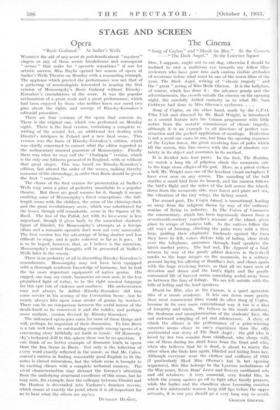STAGE AND SCREEN Opera
"Boris Godunof." At Sadler's Wells Without the aid of any secret de polichinelk about "mystery" singers or any of those scenic breakdowns and consequent " scenes " that make for " operatic sensations " if not for artistic success, Miss Baylis opened her season of opera at Sadler's Wells Theatre on Monday with a resounding triumph. The applause which greeted the performance was not that of a gathering of musicologists interested in hearing the first version of Moussorgsky's Boris Godunof without Rimsky- Korsakov's emendations of the score. It was the popular acclamation of a great work and a great performance, which had been enjoyed by those who neither knew nor cared two pins about the rights and wrongs of Rimsky-Korsaltov's editorial procedure.
There are four versions of the opera that concern us. There is the original one, which was performed on Monday night. There is the final version, containing a complete re- writing of the second Act, an additional Act dealing with Dinaitri's intrigues in Poland and a new final scene. This version was the basis of Rinisky-Korsakov's edition, which was chiefly concerned to correct what the editor regarded as the rudimentary musical grammar of Moussorgsky. Finally there was what we may call the " Chaliapin " version, which is the only one hitherto presented in England, with or without that great singer. This was based on Rimsky-Korsakov's edition, liut altered the order of the scenes, making thereby nonsense of the chronology, in order that Boris shOuld be given the best " curtains."
The choice of the first version for presentation at Sadler's Wells may seem a piece of pedantry unsuitable to a popular theatre. But there are good reasons for it, though it means omitting some of Moussorgsky's finest conceptions—the full- length scene with the children, the scene of the chiming-clock and the great revolutionary scene, which was substituted for the lesser, though still remarkable, scene in the Square of St. Basil. The loss of the Polish Act with its love-scene is less important, though it gives body to the somewhat shadowy figure of Dimitri, for Moussorgsky's attempts at a foreign idiom and a romantic operatic duet were not very successful. The first version has the advantage of being shorter and less difficult to stage, and is quite coherent so far as it goes. It is to be hoped, however, that, as I believe is the intention, Moussorgsky's second thoughts will be presented at Sadler's Wells later in the season.
There is no pedantry at all in discarding Rimsky-Korsakov's amendments. Moussorgsky may not have been equipped with a thorough academic knowledge of harmony, but he had the far more important equipment of native genius. His rugged, one may say crude, harmohies arc now seen, in the less prejudiced light of today, to be the right musical language for this epic tale of violence and madness. His orchestration may not always be skilful—Rimsky-Korsakov ' did him some service in his scoring of the Coronation Scene—but he nearly always hits upon some stroke of genius by instinct. There can be no comparison between the awful horror of the death-knell as he conceived it and the milder, and perhaps more realistic, version devised by Rinisky-Korsakov.' • ' The unlearned opera-goer cares for none. of these things and will; perhaps; be impatient of their discussion: To him s. .Bori is a tale well told; an outstanding example emoneoperas of a convincing story faithfully set forth in music. Of Moussorg- cky's technical skill in this sphere there can be no question. I can think of no better example of dramatic truth in opera than the Inn 'Scene in Boris. Not only is the inflection of every word exactly reflected in the music, so that Mr. CalVo- coressi's success in finding reasonably good English to fit the notes is almost miraculous, but the whole scene is. brought to its exciting climax with a complete technical mastery. The' vivid characterisation may distract the 'listener's `attention from the underlying structural excellence of this scene, but he may note, for example, how the colloquy between Dimitri and the Hostess is dovetailed into Varlaam's drunken reverie; which ceases at exactly the point where it is all-important for us to hear what the others arc saying. DYNELEY litrgEV.










































 Previous page
Previous page